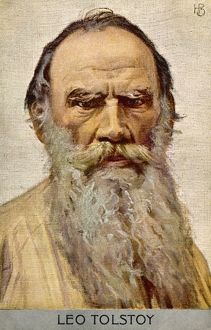Leo Tolstoy Archive
Written: 1899
Source: Original text from Gutenberg.org
Transcription/Markup: Andy Carloff
Online Source: RevoltLib.com; 2021

Their conversation was interrupted by the inspector, who said that the time was up, and the prisoners and their friends must part. Nekhludoff took leave of Vera Doukhova and went to the door, where he stopped to watch what was going on.
The inspector’s order called forth only heightened animation among the prisoners in the room, but no one seemed to think of going. Some rose and continued to talk standing, some went on talking without rising. A few began crying and taking leave of each other. The mother and her consumptive son seemed especially pathetic. The young fellow kept twisting his bit of paper and his face seemed angry, so great were his efforts not to be infected by his mother’s emotion. The mother, hearing that it was time to part, put her head on his shoulder and sobbed and sniffed aloud.
The girl with the prominent eyes—Nekhludoff could not help watching her—was standing opposite the sobbing mother, and was saying something to her in a soothing tone. The old man with the blue spectacles stood holding his daughter’s hand and nodding in answer to what she said. The young lovers rose, and, holding each other’s hands, looked silently into one another’s eyes.
“These are the only two who are merry,” said a young man with a short coat who stood by Nekhludoff’s side, also looking at those who were about to part, and pointed to the lovers. Feeling Nekhludoff’s and the young man’s eyes fixed on them, the lovers—the young man with the rubber coat and the pretty girl—stretched out their arms, and with their hands clasped in each other’s, danced round and round again. “To-night they are going to be married here in prison, and she will follow him to Siberia,” said the young man.
“What is he?”
“A convict, condemned to penal servitude. Let those two at least have a little joy, or else it is too painful,” the young man added, listening to the sobs of the consumptive lad’s mother.
“Now, my good people! Please, please do not oblige me to have recourse to severe measures,” the inspector said, repeating the same words several times over. “Do, please,” he went on in a weak, hesitating manner. “It is high time. What do you mean by it? This sort of thing is quite impossible. I am now asking you for the last time,” he repeated wearily, now putting out his cigarette and then lighting another.
It was evident that, artful, old, and common as were the devices enabling men to do evil to others without feeling responsible for it, the inspector could not but feel conscious that he was one of those who were guilty of causing the sorrow which manifested itself in this room. And it was apparent that this troubled him sorely. At length the prisoners and their visitors began to go—the first out of the inner, the latter out of the outer door. The man with the rubber jacket passed out among them, and the consumptive youth and the disheveled man. Mary Pavlovna went out with the boy born in prison.
The visitors went out too. The old man with the blue spectacles, stepping heavily, went out, followed by Nekhludoff.
“Yes, a strange state of things this,” said the talkative young man, as if continuing an interrupted conversation, as he descended the stairs side by side with Nekhludoff. “Yet we have reason to be grateful to the inspector who does not keep strictly to the rules, kindhearted fellow. If they can get a talk it does relieve their hearts a bit, after all!”
While talking to the young man, who introduced himself as Medinzeff, Nekhludoff reached the hall. There the inspector came up to them with weary step.
“If you wish to see Maslova,” he said, apparently desiring to be polite to Nekhludoff, “please come to-morrow.”
“Very well,” answered Nekhludoff, and hurried away, experiencing more than ever that sensation of moral nausea which he always felt on entering the prison.
The sufferings of the evidently innocent Menshoff seemed terrible, and not so much his physical suffering as the perplexity, the distrust in the good and in God which he must feel, seeing the cruelty of the people who tormented him without any reason.
Terrible were the disgrace and sufferings cast on these hundreds of guiltless people simply because something was not written on paper as it should have been. Terrible were the brutalized jailers, whose occupation is to torment their brothers, and who were certain that they were fulfilling an important and useful duty; but most terrible of all seemed this sickly, elderly, kindhearted inspector, who was obliged to part mother and son, father and daughter, who were just the same sort of people as he and his own children.
“What is it all for?” Nekhludoff asked himself, and could not find an answer.